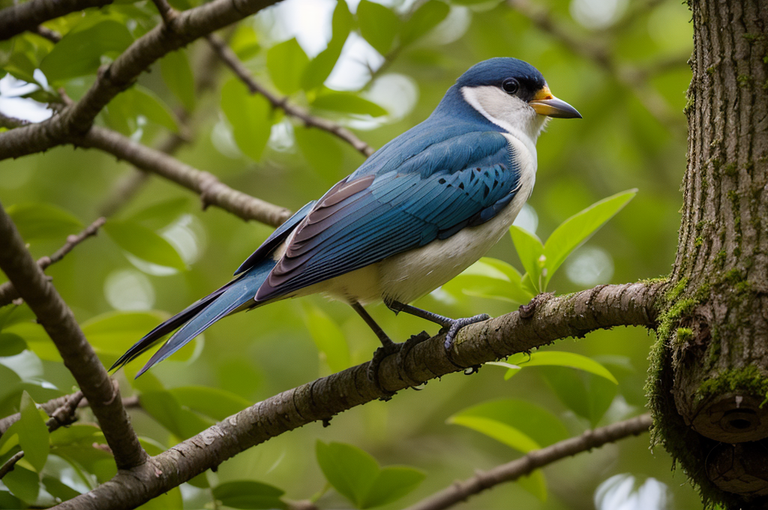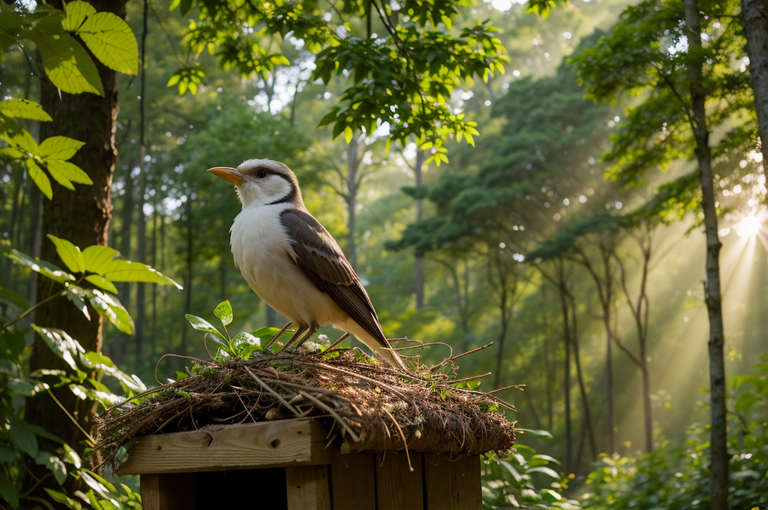Decoding the Diversity: A Comprehensive Guide to Bird Egg Identification and Their Role in Biodiversity

The Richter Museum’s guide identifies bird eggs from Wisconsin and nearby states. Accurate identification considers size, shape, habitat, nest type, and clutch size. Bird eggs are vital for maintaining biodiversity. UK law protects bird eggs.
Understanding Bird Eggs
There’s something so captivating about the mammoth diversity of bird eggs. Diverse, intricate and beguiling, they are much more than just an origin point for a feathery life.
The Basics of Bird Eggs
Now, wild bird eggs identify as enigmatic conundrums, each encapsulating essential avian truths. You see, bird eggs aren’t one size fits all. They are produced in a stunning array of shapes, sizes, and colors, each as mesmerizing as the next. It’s like doing a life sized puzzle, piecing together the intricate design and color with the species it belongs to.🔎🥚
The Diversity in Bird Eggs
Interestingly, the kaleidoscope of colors and designs of these small wonders are predominantly dictated by their nesting places. Ground nesting birds prefer laying brown, speckled eggs – a perfect camouflage strategy for survival, while tree nesting birds lay blue or green eggs. It’s quite glorious how each egg symbolizes a story, an adaptation crafted for years, that is as beautiful as it is functional.🌳
The Role of Eggs in Bird Survival
But the true essence of eggs lies in their pivotal role in bird survival. An egg equates to a budding life, a promise for the continuation of a species. They are the testament of biodiversity, essential in maintaining the vibrant tapestry that is Mother Nature. From the shell to the yolk, each element is carefully coded for survival, not just survival, but rightful flourish.🐦
All in all, understanding bird eggs is like decrypting the most fascinating cipher of the bird world. It’s a journey inhabited with wonder, beauty, and survival, one that makes this avian marvel all the more captivating. Hatching each mystery, we draw closer to truly understanding the mystic allure of these winged creatures.

Bird Egg Identification
Reverently, as I walk through the vast untouched habitats of the wild birds of california, the enchanting allure of bird egg identification often captivates me. Each egg tells a story that whispers of the secretive life of the bird species it belongs to. Taking consideration of various aspects like size, shape, habitat, nest type, and clutch size often brings me closer to unraveling those stories.
Aspects of Egg Identification
In identifying eggs, one must tread carefully, for eggs are like puzzle pieces to a vast avian mosaic. It’s about thinking beyond just the egg; where was it found, in what type of nest, and how large is the clutch? These are stirrings that often tickle the curiosity within me and assist in the identification process.
Importance of Accurate Identification
Wild eggs are delicate, wondrous vessels of life, bearers of the future of their species. Their accurate identification serves the cogent purpose of conservation, allowing us to protect them and further our understanding of their behavior and characteristics. Identification promises insight into each species, contributing to our collective consciousness about these winged miracles, perfecting our endeavor to safeguard them.
Limitations of Egg Identification
However, the identification process isn’t always a clear flight. The road to discovery is often shrouded in mystery and ambiguity with guides generally refraining from allowing searches by egg color or shape due to their potential variability. This reality imbues the process with a fascinating challenge. Each egg is a unique enigma, an intriguing hint of the profound complexities of the avian world waiting to be unscrambled.

Legal Protections
Through binocular clad eyes, I watch a sleepy sun shyly peek over the horizon, illuminating the dew kissed leaves where california wild birds chirp their dawn songs. Their ethereal music dances in the air a perfect symphony from the natural conductors of mother nature. However, their peace is not untouched. A delicate egg cradles the promise of life, and it needs our protection.
Legal Aspects of Bird Egg Protection
Often, I find myself marveling at the architectural prowess in weaver bird’s nests, and the delicate cradle they form for those tiny eggs. I am reminded of the determined guardian of these treasures, the Wildlife and Countryside Act 1981. The law thwarts any attempts to intentionally take, destroy, or disturb the cradle song of bird eggs.
Restrictions on Disturbing Bird Eggs
Perturbed by the absence of an orchestra in the morning, my mind grapples with its loss. The law forbids intrusion, not just into the realm of eggs, but onto their humble abodes, most prominently during nesting time. As the world awakens, these sanctuaries must remain inviolate, a hallowed ground for the fledging arias to hatch.
Responsibly Sharing Information About Bird Nests
As my fingers dance on the keyboard, echoing the morning’s beautiful symphony, I remember the creatures whose stories I unveil to the world. Especially when I weave tales about rarer avian gems, my words must be chosen carefully. Carelessly spread information can be as lethal as a snake in the nest. Conscious of this responsibility, we tread softly, wingtip to keyboard.
We stand as the silent guardians of our avian wards, ensuring they can woo the world with their morning serenades unfettered. As the actively scribbled notes from my dawn encounters mold into the day’s narratives, I yearn for our readers to appreciate the importance of protecting these enigmatic creatures, allowing the melodies of the wild to echo for generations untouched.

Abundant Aids for Avian Egg Exploration
To the burgeoning bird buff, the vast ocean of avian knowledge might often seem as intimidating as it is mesmerizing. But fear not, fellow ornithophiles! Adapting to the skies isn’t as daunting as it seems not with the magnificent medley of resources at our disposal. For bird eggs specifically, there is an astoundingly extensive catalogue of aids to awaken our understanding and appreciation.
An Overview of Our Avian Allies
Indeed, from the bustling Bird Spot Forums to the bountiful Bird Spot Shop – every corner of the internet and every cranny of our bookshelves reverberate with the calls of knowledge seekers like ourselves fighting tooth and nail to take flight (only metaphorically, of course 😄). The wild birds 2010 revolution brought in newer flashier, resources burst onto the scene. But one of my personal favorite tools of the trade? A humble bird egg identification guide.
How Do These Resources Help?
You might be asking, ”Penelope, how does a simple guide book help?” Well, these resources are no ordinary troves of information. Enriched with detailed color photographs, elaborate descriptions, and invaluable breeding distribution maps, they become your personal oracles that irradiate the divine secrets of bird egg study. Their worth is immeasurable!
Identification Guides - Our Feathered Friends’ Biographers
Guides like the Bird Egg Identification Guide from the Richter Museum at the University of Wisconsin Green Bay serve as profound, regional encyclopedias brimming with bird secrets. Every entry brings one bird back to life, unfurling its mysteries like an intriguing theater act. So go on, grab a guide, and leap into this fascinating world of our feathered companions. The skies await!
Key Takeaways
Significance of Bird Egg Identification
Certainly, there’s more to the art of wild bird eggs identify than just an intellectual curiosity. Each speckled shell can reveal a story about our diverse ecosystem and its interconnected inhabitants. When we learn to identify the wild birds of California, or Florida, or Alaska, we are not merely cataloguing species we are preserving biodiversity and ensuring survival for our avian companions.
Legal Aspects Involved In Egg Protection
Before you start pocketing finds during your morning trails, remember there are legal aspects to consider. Legal mandates such as the Wildlife and Countryside Act 1981 highlight our societal obligation to safeguard bird eggs. Breaching this can have serious consequences, not just for us but also the California wild birds, or the ones in your local greenspace.
Utility and Importance of Study Resources
The curious trove of study resources at our fingertips forums, shops, and guides aren’t just catalogues or mere collection of knowledge. They are essential, formidable tools that aid in the noble cause of bird egg identification. By fostering a robust understanding of wild birds 2010 and beyond, we take steps toward making the world a safer place for our avian allies.
When we learn to identify wild birds and their eggs, we’re doing more than just solving puzzles or satisfying personal curiosity. We’re stepping up for Mother Nature, who might just smile and endow us with even more of her feathery wonders. So, the next time you stumble upon an egg on your path, remember: it is not just a bird’s egg it’s a symbol of life, diversity, and survival. Get to know it, respect it, and of course, leave it untouched. As nature lovers know, observing without interfering is the best form of appreciation.


